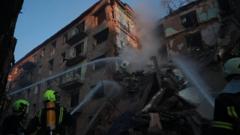The summit will focus on escalating defense spending as the U.S. and European countries navigate internal disagreements and external threats.
Is This the Most Crucial NATO Summit in a Generation?

Is This the Most Crucial NATO Summit in a Generation?
As tensions mount globally, the upcoming meeting of NATO leaders may redefine military alliances.
As the geopolitical landscape becomes increasingly charged, anticipation surrounds the upcoming NATO summit in the Netherlands, where U.S. President Donald Trump is set to make his first appearance since re-election. This summit occurs against the backdrop of increasing military tensions after the U.S. launched strikes on Iranian nuclear facilities. European allies are under pressure to dispel Trump's narrative that they rely too heavily on American military support.
Diplomatic relations between the U.S. and its European partners have soured recently, with ongoing disputes over trade and defense responsibilities. A European diplomat disclosed a grim possibility—there were doubts about Trump even attending the summit, as the West faces scrutiny from both Russia and China. NATO's Secretary General, Mark Rutte, has crafted the agenda to appeal to Trump, who has long criticized allies for not meeting defense spending benchmarks.
In a last-minute twist, the decision of Iran's next actions could influence Trump’s attendance, as a significant discussion surrounding Middle Eastern geopolitics might ensue. European leaders who have advocated for more diplomatic solutions to Iran’s nuclear ambitions may find themselves at odds with Trump’s hardline approach.
A major commitment may be on the table as the summit has reportedly secured pledges for defense spending to reach 5% of each nation's GDP. However, skepticism looms, especially with Spain’s claim of an exemption from this plan. The fragility of consensus is evident—while some countries, like Poland, are proactively investing in defense to enhance their military readiness, others are grappling with the financial burden and implications of such an increase.
As the summit approaches, they also face the daunting reality of needing to confront capabilities gaps within NATO infrastructure. The myth of European military independence could be challenged if it's not adequately prepared for the extensive financial implications of Trump's demands.
Former U.S. officials have remarked that this meeting might set a precedent for NATO's commitment to collective security strategies in light of Russia's increasing military assertiveness. Trump has reiterated that while he expects European allies to step up, their preparedness for emerging threats directly relates to NATO's collective efficacy.
Overall, this summit promises to be a pivotal moment for NATO’s future, potentially reshaping Europe's defense posture in a landscape marked by increasing global tensions. However, the outcome will heavily depend on the unpredictable nature of Trump's negotiations. As political heads assemble in the Netherlands, the global community will be watching closely.
Diplomatic relations between the U.S. and its European partners have soured recently, with ongoing disputes over trade and defense responsibilities. A European diplomat disclosed a grim possibility—there were doubts about Trump even attending the summit, as the West faces scrutiny from both Russia and China. NATO's Secretary General, Mark Rutte, has crafted the agenda to appeal to Trump, who has long criticized allies for not meeting defense spending benchmarks.
In a last-minute twist, the decision of Iran's next actions could influence Trump’s attendance, as a significant discussion surrounding Middle Eastern geopolitics might ensue. European leaders who have advocated for more diplomatic solutions to Iran’s nuclear ambitions may find themselves at odds with Trump’s hardline approach.
A major commitment may be on the table as the summit has reportedly secured pledges for defense spending to reach 5% of each nation's GDP. However, skepticism looms, especially with Spain’s claim of an exemption from this plan. The fragility of consensus is evident—while some countries, like Poland, are proactively investing in defense to enhance their military readiness, others are grappling with the financial burden and implications of such an increase.
As the summit approaches, they also face the daunting reality of needing to confront capabilities gaps within NATO infrastructure. The myth of European military independence could be challenged if it's not adequately prepared for the extensive financial implications of Trump's demands.
Former U.S. officials have remarked that this meeting might set a precedent for NATO's commitment to collective security strategies in light of Russia's increasing military assertiveness. Trump has reiterated that while he expects European allies to step up, their preparedness for emerging threats directly relates to NATO's collective efficacy.
Overall, this summit promises to be a pivotal moment for NATO’s future, potentially reshaping Europe's defense posture in a landscape marked by increasing global tensions. However, the outcome will heavily depend on the unpredictable nature of Trump's negotiations. As political heads assemble in the Netherlands, the global community will be watching closely.























